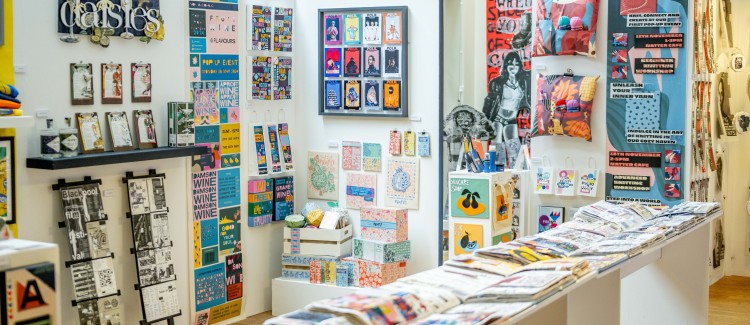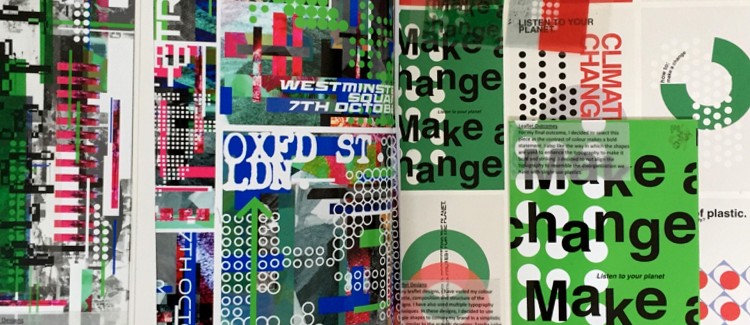Design: Graphic Design and Communication A Level
A Level | AQA
Discover the world of Graphic Design which is all around us. Communication through design is key and is a fundamental part of our everyday lives. Be inspired to make a difference in the ever-evolving world of design.This is an art-based graphic design course. We introduce you to a broad range of styles and design movements. You will be involved in designing, creating, and solving graphical problems in order to meet the needs of commercial briefs. Visual Communication is key!
You will explore how messages can be successfully communicated through the organisation of images and words, as well as three-dimensional design. If you like the idea of designing using both freehand drawing as well as computer-generated techniques, if you want to create work with paper, card, foam and plastics, and, have an interest in designing packaging, corporate identities, point of sale displays, logo’s, typography, and multi-media design then opt for this graphics course.
First Year:
You will develop your designing, sketching, CAD (Illustrator and Photoshop), and making capabilities through a series of short projects and activities culminating in your own project. You will specifically work in the areas of packaging design, use of typography, symbolism, and image manipulation. You will also undertake a mock exam set graphic project at the end of the year.
The short projects each develop your skills, interests and techniques in the following areas:
- Sketching/drawing
- CAD software
- Illustration
- Typography
- Designing
- Mixed Media Manipulation
- Research
- Logo Design
- Packaging
- Printmaking Techniques
- Fashion
- Photography
- 2D/3D Mixed Media
- Branding
- Visual Identity
- Page Layout
In your second term, you will move on to your own extended project work.
Finally, in your third term, you will be working on your own response to an exam set theme.
Second Year:
You will extend and develop further your technical understanding of printing techniques, manufacturing processes, typography, illustration, and multimedia. Your capabilities to generate ideas through drawing and CAD will be further extended.
You will need to undertake a personal study of designers and artists or an art & design movement as well as complete a series of short projects together with an extended project of your own choosing.
In your final period, you will also complete a project set by the exam board in response to their theme. If you enjoy branding, packaging, illustration, and working in mixed media then this is the course for you.
To view students work visit www.godalmingcollegearts.com
What are the entry requirements?
A minimum of five GCSE subjects at grade 4 or above. A GCSE Design Technology or an Art is preferred but not essential.
How will I be assessed?
This is a 100% coursework assessed A level subject (2 year course). There are no written exams instead you are required to demonstrate your knowledge, understanding, and capabilities through your practical and design work.
In your first year your design book will contain:
- Evidence of the techniques we have taught you through the set Exercises and short projects;
- Evidence of your own extended project (to include research, analysis, designing, and making);
- Preliminary design work for the exam board-set project; and
- Final designs and outcomes.
You will gain first-hand experience learning about the key stages of the Graphic Design process and all aspects of Visual Communication.
In your second year this pattern is repeated, but with more emphasis on your own projects. You will also submit a personal study on the work of an artist(s)/designer(s) or art & design movement.
| Component | Method | % |
|---|---|---|
| Coursework | Component 1 Personal Study. Starts L6 September. Ends U6 January. Techniques + Own Projects. Teacher led short projects and activities. Followed by series of Independent projects. | 60% |
| Externally Set Assignment | Based on an open exam theme but still your free choice + 15 hour practical exam. | 40% |
What extra work can I do?
You are also expected to keep up to date with current exhibitions, research designers that inspire you via Pinterest and Instagram.
What skills will I learn?
Your week is divided into different sessions, each designed to help improve your drawing, digital, and designing techniques. As the term progresses some of the time is still devoted to purely techniques extending your abilities to record your ideas as well as making; and some of the time is devoted to understanding technological issues (material properties, printing processes, and graphic design movements) but gradually more and more time is given over to your project work.
You will initially be developing your design skills in Visual Communication, through the use of text, images and symbols. The three main skills areas include:
- Visual Arts
- Typography
- Page Layout.
As the course progresses, you will then be free to choose your own project area and specialism. A key difference you will notice from school is our departmental tutorial system. You will receive regular 1-1 sessions with your teachers to help discuss your progress and to plan your project work.
What is the department like?
A design studio with CAD/CAM facilities (including laser), an A1 printer, as well as a well-equipped studio. We use Adobe software including Illustrator and Photoshop in our teaching areas.
We operate an Open Access policy – which means you can use the facilities any time you do not have a lesson as well. There is a small yearly charge (£36) levied on this course to pay for all necessary materials to successfully complete the course and help with the cost of extra materials. This works out at roughly £1 per week.
What are the progression routes for this qualification?
This course is highly regarded by the universities as an excellent foundation for degree study in any design field. Our students go on to study an Art Foundation or go straight to a degree in their chosen creative field e.g. Graphic Design, Illustration & Animation, Interior Design, Architecture, Visual Communication etc.
It is particularly useful to those of you considering advertising, animation, art foundation, graphics, illustration, multimedia and digital design. With this qualification, you can simply use it as an entry subject for any university course.
"Don't confuse legibility with communication. Just because something is legible doesn't mean it communicates and, more importantly, doesn't mean it communicates the right thing" ~ David Carson.

